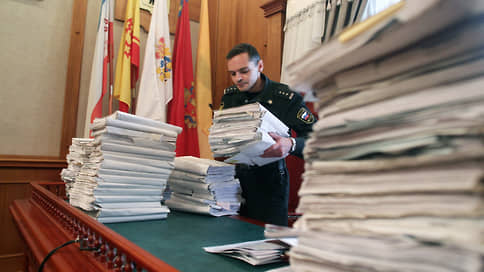In Russia, they may allow correction of errors in administrative protocols

The absence of the signature of the protocol or the personal data confused in it may cease to be the reason for the termination of proceedings on administrative offenses. The Government Commission on Foreign Affairs on March 31 will consider the draft amendments to the Code of Administrative Offenses: if it is supported by the State Duma, officials will have three days to correct errors in documents that are often the only evidence in the case. The author of the project, the Ministry of Justice, refers to the need to exclude the possibility of violators to evade liability on formal grounds, but the proposed measure will even more reduce the number of acquittals in administrative matters – now there are only 5% in cases of violations of individuals and 9% in administrative disputes with business.
The Government of the Government on Forever Activities will today consider the draft amendments to the Code of Administrative Offenses (Code of Administrative Offenses) – according to them, drawn up with errors or unsigned protocols on administrative violations will cease to be recognized as unacceptable evidence and consider the grounds for terminating such cases. The bill was developed by the Ministry of Justice for the implementation of the Resolution of the Constitutional Court (KS) dated October 3, 2024 No. 43P and supported by the Supreme Court (Sun), as well as the Presidential State and Legal Administration. The decision of the COP was adopted following the results of the consideration of the case, in the framework of which the citizen disputed the constitutionality of certain provisions of the Code of Administrative Offenses. The subject of proceedings initially was the administrative protocol, where there was no signature of an official. Because of this, the protocol was recognized as unacceptable evidence, which allowed the violator to avoid punishment.
According to the current version of the Code of Administrative Offenses of the Russian Federation, when identifying serious violations in the preparation of the administrative protocol, the judge is obliged to terminate the proceedings.
The explanatory note to the amendments of the Ministry of Justice mentions among such errors not only the absence of the signature of the official, but also other violations – errors in the name and surname of the offender, the absence of the date or time of the incident, etc. At the same time, as stated in the decision of the Constitutional Court, these shortcomings can not always be eliminated by calling the case to the judge who aroused the case, for example, the employee is sick or resigned. The judge himself does not have the right to eliminate violations, since his interference in the case will lead to the fact that he will “replace the side of the prosecution”.
According to the bill of the Ministry of Justice, if the protocol is incorrectly drawing up, such materials can be returned to eliminate deficiencies to the body whose official drawn up the protocol. In addition, it is proposed to return the materials of the case for revision in case of improper qualification of the actions of the person held accountable. A period of not exceeding three days from the date of receipt of all materials to the court is not exceeding the “alteration” of the protocol that has not been arranged, with the possibility of appealing the refund to the body that initiated it.
The development of the bill was accompanied by a difficult coordination: for example, the Prosecutor General’s Office had claims to it, where it was noted that the proposed appealing deadlines for the return of the case file would result in difficulties with law enforcement.
The department also indicated that the procedure for eliminating the deficiencies of procedural documents requires refinement, for example, the procedure for making a final procedural decision in the case after it is returned (notifying the person involved, initiating a new case or issuing a resolution on retraining). In addition, the discrepancies were between the Ministry of Justice and the Ministry of Internal Affairs – the latter also counted on longer terms for eliminating the shortcomings. The Ministry of Justice, however, insisted that officials are already obliged to conscientiously fulfill their duties and correctly fill out documents.
It should be noted that cases of canceling court decisions due to shortcomings in the protocols on administrative offenses regularly reach the Armed Forces. Among the most common mistakes are the incompleteness of the documents and evidence, the incorrect drawing up of the protocols and the distortion of the data contained in them. At the same time, back in 2020, the position of the Armed Forces, which now supported the amendments of the Ministry of Justice, was diametrically opposite: then the Board of Administrative disputes of the Armed Forces canceled the decisions of lower instances in case No. 5-AD20-2, recognizing that violations in the execution of documents (correction of dates and lack of signatures) are the basis for this. The administrative authority is not entitled unilaterally to arbitrarily draw up or make changes to the protocols, noted the Armed Forces. The court indicated that before the person’s recognition, it was necessary to study all evidence during a public meeting in order to ensure the competitiveness of the process. It was also indicated that if in the guilt of a person held administratively responsible, there are doubts, then they are interpreted in favor of the defendant.
The state in disputes with citizens and business acts as a strong side, and in administrative affairs the protocols are often the only evidence in the case. The inadmissibility of corrections in protocols has still been one of the ways to ensure discipline in regulatory authorities and “compensate” to private individuals and companies weakness in disputes with officials participating in them on a professional basis. This weakness is also confirmed by statistics: the number of acquittals on administrative offenses today is extremely small – so, according to the agency of legal information, out of 6.14 million cases of the Code of Administrative Offenses considered in 2023, only 5% of cases were made in Russia (299 thousand). The companies have the share of the disputes won slightly higher – out of 191.6 thousand cases, acquittal decisions were made at 17.3 thousand (9%) – probably due to the fact that business more often uses professional legal services.
According to Pavel Grigoryev’s senior lawyer Pavel Grigoryev, the bill has high chances of accepting, which will “win numerous participants in administrative office work”: “In fact, the legislator will forgive them for the future of mistakes and will greatly simplify the work.”
The possibility of correcting the court of administrative protocols will also lead to an increase in the fees of fines and a decrease in the number of Code of Administrative Offenses won, the head of the law firm Consa Natalya Zhbanova is sure, from January 1, 2025, fines on administrative cases have already increased significantly (see “Kommersant” from Kommersant December 20, 2024, February 3), and appealing decisions is becoming increasingly difficult in connection with the systematic tightening of the legislation, the lawyer says.
Back in 2021, the Constitutional Court indicated that the absence of the ability to return the protocol does not mean the obligation to terminate the proceedings on the case, said the President of the International Union of Judicial Experts Nikolai Kandikudryakov-Tigrann: “The negligence of the preparation of such documents is a fairly common phenomenon, therefore the decision affects the interests of a significant part of the plaintiffs in civil proceedings.”
One of the reasons for changing the rules of the game in administrative production may be the echoes of the deployed, and then paused due to the military operation in Ukraine of the administrative reform in the regulatory authorities (see “Kommersant” dated November 11, 2024). In 2019, only central devices of ministries and departments affected the reduction of states and raising salaries in 2019, while they did not manage to spread to the territorial and regional administrative bodies. As a result, as recognized in the White House, tariff nets in territorial divisions were not revised, which caused their strong lag from a significant increase in salaries in the economy. “The monetary maintenance of young specialists (38 thousand rubles with a bonus) entails high staff turnover (up to 26% among young people, including up to 62% in the first year of service),” the government noted. In conditions of a sustainable personnel deficit, this situation could not but lead to the outflow of a noticeable part of the administrative authorities with an increase in the load on the remaining, or to a decrease in the requirements for hiring inspectors, which led to the decline in the quality of bureaucratic work and the need to legitimize the return of protocols for revision.




:format(webp)/s3/static.nrc.nl/images/gn4/stripped/data133212425-ae69bf.jpg)


